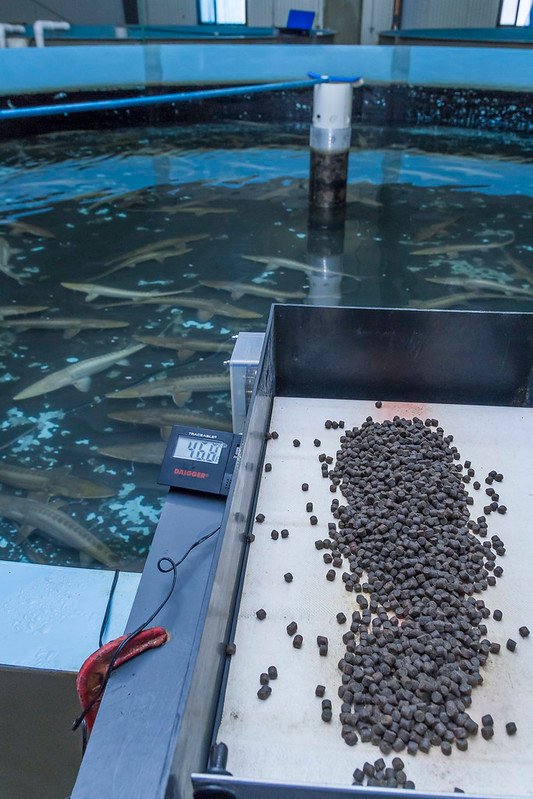Valencia, Spain.- Contributing to more sustainable aquaculture: this is the ultimate objective of the dissertation authored by Oliva native, Lorena Parra, and supervised by the the research professors from the Campus Gandia of the UPV, Jaime Llore and Miguel Rodilla. In this regard, the thesis paper presents the design and development of low-cost sensors for fish farms, with very low energy consumption and able to control up to 10 water quality; parameters. These devices monitor fish behavior, especially during the feeding period, to enable automatic adjustment of the fish feed.
The doctoral thesis demonstrates the application of these innovative systems, both in fish farms and in mangroves and estuaries. The monitoring process also includes a smart system to control and track pollution in water bodies.
THE PROBLEM OF EXCESS FOOD
According to Lorena Parra, aquaculture is making efforts to achieve sustainability but is still far from achieving it. “The food not consumed by fish is one of the main sources of contamination in aquaculture, as it can give rise to water eutrophication (excess nutrients). This increase in organic waste can lead to oxygen depletion in water and a loss of water quality,” she explains.
Therefore, it is important to develop systems that enable the adjustment of the food supplied to the fish as much as possible, so as to guarantee the sustainability of aquaculture. In addition to increasing the economic benefits of the facilities, given that the uneaten feed represents losses for the companies. “Water quality, temperature and salinity are some of the factors that affect the growth of fish. Other factors such as turbidity, photoperiod and dissolved oxygen, among others, can affect the nutritional needs of fish,” says the scientist.
“By monitoring the quality of water, it is possible to estimate the nutritional needs,” says the future doctor. “However, that is not enough. We need to objectively know the behavior of fish during their feeding and respond to it accordingly. This is not being done in most facilities, where feeding is done manually and the water quality is not monitored exhaustively.”
MONITORING TEN PARAMETERS
The system developed at the Universitat Politècnica de València enables control of up to ten parameters, including water quality, tank conditions and fish behavior during feeding. The price of the proposed system is less than €100 per tank. In addition, it enables automatic adjustment of the fish feeding process and sends alarms to the workers in case the water quality exceeds the established values.
Stay Always Informed
Join our communities to instantly receive the most important news, reports, and analysis from the aquaculture industry.
According to Lorena Parra, a preliminary study of the requirements of the sensors in aquaculture was carried out as part of the thesis project, as well as an analysis of the existing sensors for monitoring both water quality and aquaculture. Only then were the proprietary sensors designed and put to the test both in fish farms and in natural aquatic areas, such as mangroves and estuaries. The sensor network and the sensors themselves will allow access to the data and control the processes remotely, through the Internet.
Lorena Parra is a graduate of the UPV: first with a Bachelor’s Degree in Environmental Sciences and then a Master’s Degree in Assessment and Environmental Monitoring of Marine and Coastal Ecosystems, both at Campus Gandia, as well as the Master’s Degree in Aquaculture at the Vera Campus of the UPV.
More information at:
Parra Boronat, Lorena
loparbo @ doctor.upv.es
http://www.upv.es/ficha-personal/loparbo
Source: Universitat Politècnica de València
Editor at the digital magazine AquaHoy. He holds a degree in Aquaculture Biology from the National University of Santa (UNS) and a Master’s degree in Science and Innovation Management from the Polytechnic University of Valencia, with postgraduate diplomas in Business Innovation and Innovation Management. He possesses extensive experience in the aquaculture and fisheries sector, having led the Fisheries Innovation Unit of the National Program for Innovation in Fisheries and Aquaculture (PNIPA). He has served as a senior consultant in technology watch, an innovation project formulator and advisor, and a lecturer at UNS. He is a member of the Peruvian College of Biologists and was recognized by the World Aquaculture Society (WAS) in 2016 for his contribution to aquaculture.







